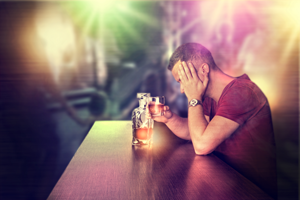Are you an alcoholic? What are the signs of alcoholism?
Most people who drink, even to excess, do not consider themselves an alcoholic because they have a mental picture of the alcoholic being the homeless man who lives on the street, shuffling along looking in bins and carrying his half empty flask in his brown paper bag.

Or they think the alcoholic is the man who goes to a soup kitchen once a day for a hot meal.
And that, they say, is not me!
So consider the following scenarios:
The man who goes all week without having any alcohol, yet drinks to excess on a Friday and Saturday night and comes home late, slurring, and has a hang over the next day – is he an alcoholic?
The person who has several drinks daily after work – too many to legally be able to drive home, but never enough to get blind drunk – is he or she an alcoholic?
The person who has pre-dinner drinks daily and a glass of wine at dinner – then finishes off the bottle of wine alone after dinner – is he or she an alcoholic?
The woman who opens a bottle of wine when at home alone and generally finishes it the same or the next day – is she an alcoholic?
The woman who goes out regularly with girlfriends for a good time, and drinks way too much and has to be put into a taxi by her friends – is she an alcoholic?
Whether or not any of these people are an alcoholic depends on one’s subjective use of the word.
However, the distinction of ‘alcoholic or not?’ is not as important as whether or not you recognize having an alcohol problem.
If your partner or another family member or friend has to speak with you about your drinking having a negative impact on him or her, and you continue to drink to the same degree, with no regard for their feelings, then yes, you have an alcohol problem. And that’s your guideline.
Everyone is different, and based on personal life experience, has different levels of acceptance about alcohol consumption. But whatever your level of drinking, if it impacts your partner, children or friends, and you are asked to reduce your consumption of alcohol and you don’t, then quite simply –yes, you have an alcohol problem.
Once you choose the alcohol over the relationship, meaning it has become a priority and you have more of a relationship with alcohol than you do with a human being – then yes, you could call yourself an alcoholic.
Children raised by alcoholic parents tend to view alcohol-related behavior as acceptable, making them more likely to engage in the addiction themselves. They grow up viewing that particular behavior as “normal” – this is just what grownup people do. So if dad or mum drinks daily, a child grows up thinking this is the norm. If they drink to excess daily, then again, children think this is what grown-ups do, and the subsequent fights, or staggering home and falling asleep on the couch, all become part of that child’s norm.
In some cultures, drinking is such an integral part of the way of life, that if you have grown up with it, it never enters your head NOT to drink.
In the UK with its pub culture, and even in Australia to some extent, having a drink “down the pub” is as normal as breathing, and you do it without even making a conscious decision about it. For this reason, many do not see it as addictive behavior – “it’s just what I do”.
If you can’t stop drinking and are hearing yourself thinking or saying the following objections:
- Ask me to STOP doing it, why no!
- Why should I? I’ve done it all my life.
- Could I go without it? No way!
… then this indeed is addictive behavior, so yes, many would say you are an alcoholic.

